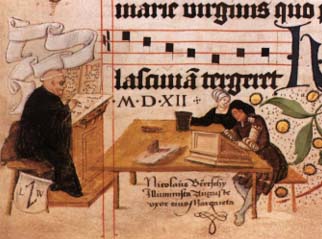|
ENGL 203: Core I: Medieval


 Prerequisites:
Completion of GE area A and ENGL
251; open to ENGLISH MAJORS ONLY. Prerequisites:
Completion of GE area A and ENGL
251; open to ENGLISH MAJORS ONLY. |

 Course
Description and Objectives: ENGL 203
introduces English majors to the vernacular-language
literature of medieval Britain as well as to influential
Continental works--the foundation upon which modern
English literature stands. In addition to presenting a
number of important medieval authors and works, the
course aims to familiarize you with medieval attitudes
toward authorship and textuality, with medieval modes of
textual production, and with specific textual practices
relevant to the interpretation of medieval literature. Course
Description and Objectives: ENGL 203
introduces English majors to the vernacular-language
literature of medieval Britain as well as to influential
Continental works--the foundation upon which modern
English literature stands. In addition to presenting a
number of important medieval authors and works, the
course aims to familiarize you with medieval attitudes
toward authorship and textuality, with medieval modes of
textual production, and with specific textual practices
relevant to the interpretation of medieval literature.
 By the end of the quarter,
you will be familiar with the most significant
vernacular-language authors working in England between
the 8th and 15th centuries and with key continental
writers who illuminate the development of an English
literary tradition. You will be able to identify and
distinguish between significant medieval literary
genres. You will have gained an understanding of how
medieval literature differs from modern literature (and
from modern notions of what literature is): e.g.
the differences between manuscript and print cultures;
the tension between Latin and the vernacular languages;
the emphasis on literature as an on-going process rather
than an end product, and thus the inappropriateness of
modern notions of "originality" or "intellectual
property" in the medieval context. By the end of the quarter,
you will be familiar with the most significant
vernacular-language authors working in England between
the 8th and 15th centuries and with key continental
writers who illuminate the development of an English
literary tradition. You will be able to identify and
distinguish between significant medieval literary
genres. You will have gained an understanding of how
medieval literature differs from modern literature (and
from modern notions of what literature is): e.g.
the differences between manuscript and print cultures;
the tension between Latin and the vernacular languages;
the emphasis on literature as an on-going process rather
than an end product, and thus the inappropriateness of
modern notions of "originality" or "intellectual
property" in the medieval context.
Finally, by the end of the quarter, you will have
bonded with the classmates with whom you will be
studying over the next two years!

 Preliminary Remarks: Much of what
is presented in ENGL 203 will be new to most of you, and
many of the readings reflect assumptions and ideas that
appear strange to a 21st-century audience. For these
reasons, several remarks are in order.
Preliminary Remarks: Much of what
is presented in ENGL 203 will be new to most of you, and
many of the readings reflect assumptions and ideas that
appear strange to a 21st-century audience. For these
reasons, several remarks are in order.
 1) ENGL
203 is a READING-INTENSIVE COURSE. The material covered
is unfamiliar, complex and challenging, the pace brisk.
One week or another there will probably be a
topic/author which you find difficult or simply do not
enjoy. If and when this occurs, remember that we will
soon move on to something else! Because ENGL 203 is a
survey, you are not expected to master the material
presented in the depth you would in an advanced course
with a narrower focus. So while you will need to keep
up with the readings and should read
carefully (using study guides), don't
torture yourself if the details of a given text prove
difficult to grasp. We are looking for the broad
picture, not the close-up; the idea is to provide you
with a sense of the way in which English
literature--and English perceptions of what literature
is--evolved during the course of the Middle
Ages. Readings will be considered as
contextual evidence reflecting the "world view" of the
author and period when they were written. 1) ENGL
203 is a READING-INTENSIVE COURSE. The material covered
is unfamiliar, complex and challenging, the pace brisk.
One week or another there will probably be a
topic/author which you find difficult or simply do not
enjoy. If and when this occurs, remember that we will
soon move on to something else! Because ENGL 203 is a
survey, you are not expected to master the material
presented in the depth you would in an advanced course
with a narrower focus. So while you will need to keep
up with the readings and should read
carefully (using study guides), don't
torture yourself if the details of a given text prove
difficult to grasp. We are looking for the broad
picture, not the close-up; the idea is to provide you
with a sense of the way in which English
literature--and English perceptions of what literature
is--evolved during the course of the Middle
Ages. Readings will be considered as
contextual evidence reflecting the "world view" of the
author and period when they were written.
2) Because literary production
in the Middle Ages was largely controlled by the
(Catholic) Church, many of the readings deal with
Christian themes. We will approach these readings as cultural
artifacts rather than as articles of faith,
attempting to understand the society which produced them
and the world view which they represent. While students
familiar with portions of the Old and New Testaments may
find this background useful, no prior knowledge of
Judeo-Christian tradition is assumed or required. If
something puzzles you, try the following (in this
order!): a) check the footnotes and/or introduction to
see if an explanation is provided; b) consult a
dictionary or encyclopedia; and c) ask about it in class
or office hours. (Chances are, someone else is just as
puzzled as you are!)
3) Due to the time
constraints under which we will be working, classes will
focus on interpretation rather than description.
Familiarity with the assigned readings (both background
information and primary texts) will be assumed. Readings
will NOT be summarized for you in class (which ideally
should involve discussion as well as lecture). For these
reasons, the success of the course depends largely on
you. Please make a personal commitment to come to class
regularly, punctually, and prepared. Without these
preconditions, ENGL 203 will be of little or no use to
you -- and no fun for any of us! SO: be prepared for an
intense quarter. But also remember: ENGL 203 SHOULD be
-- and usually is -- a lot of fun!

 Communicating: Communicating:
You are expected to have an email account and
to check it regularly. Important announcements
will be sent over the class
email alias. The class email
alias is automatically generated using the email address
of each enrolled student found in the Cal Poly Directory
server. If your Cal Poly email account is NOT your
preferred email address, you must
- Log into http://my.calpoly.edu/
and click on "Grades and Personal Information" (the
"Personal Information Channel") to change your
Email Delivery Address. Once you have done so,
any email sent to your <username@calpoly.edu>
, including all postings to the class alias, will be
forwarded to the address you have designated.
Remember: you are responsible for any information sent
over the class email alias (e.g. changes in
assignments; other class-related announcements), so be
sure to check your email regularly. You may also use
the alias to send a query or comment to the whole class
(including your instructor). Please do not use the
alias for matters unrelated to class.

 Attendance
Policy: Due to the twice-weekly
seminar format, any absence causes you to miss a
substantial chunk of material. Regular and
punctual attendance is required.
Please note that EVERY absence will affect the participation component
of your final course grade. Attendance
Policy: Due to the twice-weekly
seminar format, any absence causes you to miss a
substantial chunk of material. Regular and
punctual attendance is required.
Please note that EVERY absence will affect the participation component
of your final course grade.
 Each student starts out with
a 4.0 for attendance. This component of your final
grade drops by .3 for the first UNEXCUSED
absence; the penalty increases by .1 for each subsequent
unexcused absence (from A [4.0] to A- [3.7] to B+ [3.3],
to B- [2.8], etc.). Additionally, it drops .1 for
the first EXCUSED absence (4.0 to 3.9) and .2
for the second excused absence (3.9 to
3.7). Excused absences in excess of two (a
full week, 10% of the class) count the same as
unexcused absences. Each student starts out with
a 4.0 for attendance. This component of your final
grade drops by .3 for the first UNEXCUSED
absence; the penalty increases by .1 for each subsequent
unexcused absence (from A [4.0] to A- [3.7] to B+ [3.3],
to B- [2.8], etc.). Additionally, it drops .1 for
the first EXCUSED absence (4.0 to 3.9) and .2
for the second excused absence (3.9 to
3.7). Excused absences in excess of two (a
full week, 10% of the class) count the same as
unexcused absences.
Please note that only absences due to illness,
family crisis, or circumstances which are truly
beyond your control count as excused.
Deadlines for other courses, work conflicts and job
interviews are NOT valid reasons for missing
class. FOR AN ABSENCE TO BE EXCUSED, YOU MUST
SUBMIT A SIGNED, WRITTEN NOTE with course number and
section/time, date missed and an explanation of the
circumstances leading to your absence. (While I do
appreciate your courtesy in letting me know why you have
missed class, an Email or phone message will not
suffice for an absence to be excused.)


  Required Texts: Required Texts:
- The Norton Anthology of English Literature,
8th ed. (2006), vol. 1a, The Middle Ages,
ed. Alfred David [=NA]
- Chaucer, The Canterbury Tales, tr.
Nevill Coghill (Penguin Classics) [=CT]
- Chr�tien de Troyes, Arthurian Romances,
tr. William W. Kibler and Carleton W. Carroll (Penguin
Classics)
- The Portable Dante, ed./tr. Mark
Musa (Viking-Penguin)
- Joseph Gibaldi and Walter S. Achtert, MLA
Handbook for Writers of Research Papers,
6th ed. (2003)
- M. H. Abrams, A Glossary of Literary Terms,
7th ed. (1999)
(NOTE: you must use the specific text ordered for this
class. Do NOT substitute another edition/translation!!)
Also Recommended:
- The Selected Writings of Christine de Pizan,
tr. Renate Blumenfeld-Kosinski and Kevin Brownlee
(Norton Critical Edition)B�roul, The Romance of
Tristan, tr. Alan S. Fedrick (Penguin
Classics)
- The Lais of Marie de France, tr.
Robert Hanning and Joan Ferrante (Baker Books)
- B�roul, The Romance of Tristan, tr.
Alan S. Fedrick (Penguin Classics)
- Penguin History of Literature, vol. 1: The
Middle Ages, ed. W. F. Bolton. Penguin,
1993. (Out of print but available from bookfinder.com.)
 Other required
readings will be accessed electronically: Online
Readings are found in .HTML files accessible through
links on this website; E-reserve readings are .PDF
files on "electronic reserve" in the Library
Resources section of Blackboard. Please note
that ALL required electronically accessed readings should
be PRINTED OUT, PLACED IN A COURSE BINDER, AND BROUGHT
WITH YOU TO CLASS. Other required
readings will be accessed electronically: Online
Readings are found in .HTML files accessible through
links on this website; E-reserve readings are .PDF
files on "electronic reserve" in the Library
Resources section of Blackboard. Please note
that ALL required electronically accessed readings should
be PRINTED OUT, PLACED IN A COURSE BINDER, AND BROUGHT
WITH YOU TO CLASS.
- To access Blackboard,
log in at MyCalpoly,
go to "Blackboard Access" and select "ENGL 203" from
the classes you are taking. Click on the links in the
Electronic Reserves section (under "Library
Resources") to download, read and/or print the .PDF
files using Acrobat Reader.
- To access online
readings in .html files, click on the link on
the Calendar
of Assignments.
ALWAYS BRING HARD COPY OF ASSIGNED TEXTS WITH YOU TO
CLASS!

 Preparation:
Readings
are to be completed BEFORE coming to class on the date
assigned. Introductions and background handouts should
be read first; they are the context within which primary
readings will be most meaningful. The introduction to
the Middle Ages in the Norton Anthology (pp.
1-22) provides an overview of historical developments.
The NA also has good headnotes to individual authors and
works as well as a useful appendix on "Literary
Terminology" (NA pp. A23-A44). Specific introductory
pages from other textbooks are assigned on the syllabus.
Other background information is provided on handouts and
study guides. Please note that this background material
is an integral part of the course and
will be covered on EXAMS (and on Reading
Quizzes, should they be reinstated this quarter).
When reading primary texts, refer conscientiously to the
critical apparatus (footnotes, glossary, etc.). Preparation:
Readings
are to be completed BEFORE coming to class on the date
assigned. Introductions and background handouts should
be read first; they are the context within which primary
readings will be most meaningful. The introduction to
the Middle Ages in the Norton Anthology (pp.
1-22) provides an overview of historical developments.
The NA also has good headnotes to individual authors and
works as well as a useful appendix on "Literary
Terminology" (NA pp. A23-A44). Specific introductory
pages from other textbooks are assigned on the syllabus.
Other background information is provided on handouts and
study guides. Please note that this background material
is an integral part of the course and
will be covered on EXAMS (and on Reading
Quizzes, should they be reinstated this quarter).
When reading primary texts, refer conscientiously to the
critical apparatus (footnotes, glossary, etc.).
 Study Guides are provided to
guide your reading. USE THEM!! To access study guides,
click on the underlined links found on the class calendar or on
the list of online study guides below.
Study guides typically contain some background
information for which you are responsible; regard them
as an appendix to your text books. They also may
list some general questions for which you will find
answers as you read the assigned background readings, as
well as background information and study questions to
guide you through the primary readings. Familiarize
yourself with the study questions BEFORE you begin to
read, and refer to the guide frequently AS you read,
jotting down notes as you go along. Upon completing your
readings, you are strongly advised to reread the
questions and write up a summary of your ideas. This
summary will NOT be collected or graded, but will be
helpful in preparing for class -- and for
exams! (Should Reading Quizzes
be resinstated, they presuppose you have prepared for
class using the online study guides!) Study Guides are provided to
guide your reading. USE THEM!! To access study guides,
click on the underlined links found on the class calendar or on
the list of online study guides below.
Study guides typically contain some background
information for which you are responsible; regard them
as an appendix to your text books. They also may
list some general questions for which you will find
answers as you read the assigned background readings, as
well as background information and study questions to
guide you through the primary readings. Familiarize
yourself with the study questions BEFORE you begin to
read, and refer to the guide frequently AS you read,
jotting down notes as you go along. Upon completing your
readings, you are strongly advised to reread the
questions and write up a summary of your ideas. This
summary will NOT be collected or graded, but will be
helpful in preparing for class -- and for
exams! (Should Reading Quizzes
be resinstated, they presuppose you have prepared for
class using the online study guides!)
Be prepared to DISCUSS readings
in class. Note that length and difficulty of assignments
vary, so look ahead in the reading list when you are
planning your time. You are responsible for ALL the
assigned readings, whether fully discussed in class or
not, as well as for material covered in e-reserve and online readings, lectures
and discussions.


 Graded Work: Graded Work:
I. WRITING
ASSIGNMENTS: Each student will be assigned
to a Blackboard
Discussion
Board group of 6-8 students. Students
will post a series of 5 Personal Responses and 10 Classmate
Responses to their Blackboard Discussion Board
over the course of the quarter. There will also
be a longer and more formal final paper.
Both sorts of writing will require close reading of
assigned texts.
- Blackboard
Personal
Response postings: Five short mini-essays
(1-2 pages each), which can be e.g. a response to a
study question, an analysis of the author's probable
intentions, or a comparison of the new reading with a
previously read work.
- You must also
post to Blackboard ten short (but thoughtful) Blackboard
Classmate
responses (at least one meaty paragraph
each). You must post two
classmate responses for each Personal Response
assisgnment in order to receive credit for your own
Personal Responses. The Classmate
Responses will also factor into the participation
component of your final grade.
- The longer and more formal final paper
(4-5 pp.), due at the last class meeting (Th 3/8),
will be a piece of literary analysis on one or more of
the works read this quarter. You are encouraged,
but not required, to develop an idea or ideas which
you have explored in one or more of your Blackboard
Personal
Response postings.
II. READING QUIZZES:
Expect an unannounced Reading Quiz approximately once a
week. Reading Quizzes serve two useful
purposes: they give students an incentive to keep up
with course readings and they can be helpful as study
guides when preparing for exams.
- No make-up quizzes will be given. If you
miss a quiz, you will get a copy to use as a study
guide.
- No extra time will be given to late-comers
-- so come to class promptly!
- E.C. pts. are available on every quiz, and
your weakest quiz score will be dropped from
your quiz average. Thus, you can make up for a weak or
missed quiz by preparing well for subsequent quizzes.
III. EXAMS: a closed-book
Midterm Exam
in class week
6; and a three-hour, closed-book Final Exam on Thursday,
March 15, from 4:10 - 7:00 PM. Exams will
include both essay and objective sections. Final will be
cumulative, but with emphasis on work since the Midterm.
 Grading: Grading:

| Study Guides: |
|
Online Readings: |
|
|
|
Other Required Readings are available on e-reserve through
the Library Resources sections of Blackboard.
Images:
|

Contents of this and linked pages Copyright Debora
B. Schwartz, 1999-2012
[Last updated 1/2/12
|
 By the end of the quarter,
you will be familiar with the most significant
vernacular-language authors working in England between
the 8th and 15th centuries and with key continental
writers who illuminate the development of an English
literary tradition. You will be able to identify and
distinguish between significant medieval literary
genres. You will have gained an understanding of how
medieval literature differs from modern literature (and
from modern notions of what literature is): e.g.
the differences between manuscript and print cultures;
the tension between Latin and the vernacular languages;
the emphasis on literature as an on-going process rather
than an end product, and thus the inappropriateness of
modern notions of "originality" or "intellectual
property" in the medieval context.
By the end of the quarter,
you will be familiar with the most significant
vernacular-language authors working in England between
the 8th and 15th centuries and with key continental
writers who illuminate the development of an English
literary tradition. You will be able to identify and
distinguish between significant medieval literary
genres. You will have gained an understanding of how
medieval literature differs from modern literature (and
from modern notions of what literature is): e.g.
the differences between manuscript and print cultures;
the tension between Latin and the vernacular languages;
the emphasis on literature as an on-going process rather
than an end product, and thus the inappropriateness of
modern notions of "originality" or "intellectual
property" in the medieval context. 
 Each student starts out with
a 4.0 for attendance. This component of your final
grade drops by .3 for the first UNEXCUSED
absence; the penalty increases by .1 for each subsequent
unexcused absence (from A [4.0] to A- [3.7] to B+ [3.3],
to B- [2.8], etc.). Additionally, it drops .1 for
the first EXCUSED absence (4.0 to 3.9) and .2
for the second excused absence (3.9 to
3.7). Excused absences in excess of two (a
full week, 10% of the class) count the same as
unexcused absences.
Each student starts out with
a 4.0 for attendance. This component of your final
grade drops by .3 for the first UNEXCUSED
absence; the penalty increases by .1 for each subsequent
unexcused absence (from A [4.0] to A- [3.7] to B+ [3.3],
to B- [2.8], etc.). Additionally, it drops .1 for
the first EXCUSED absence (4.0 to 3.9) and .2
for the second excused absence (3.9 to
3.7). Excused absences in excess of two (a
full week, 10% of the class) count the same as
unexcused absences. 

